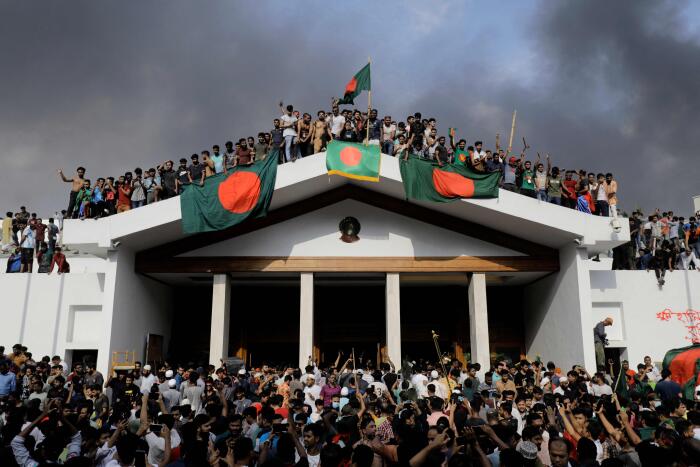Bangladesh plunges into unknown after departure of ‘Iron Lady’
Thousands of people took to the streets, bursting with joy, after the resignation of Prime Minister Sheikh Hasina, who had been in power for 15 years. Yet the period that lies ahead gives rise to as many fears as hopes.

You can share an article by clicking on the share icons at the top right of it.
The total or partial reproduction of an article, without the prior written authorization of Le Monde, is strictly forbidden.
For more information.
For all authorization requests,
Bangladesh has taken a plunge into the unknown. The outing of its prime minister, Sheikh Hasina, on Monday, August 5, gave rise to as many fears as it does hopes. Never before had a prime minister of this country stayed in power for so many years. Yet, after 15 years of increasingly autocratic rule, the “Iron Lady” was forced to flee, under pressure from the crowds on the streets. At 2:25 pm, she hastily boarded an army helicopter, without even having time to record a final message to the nation, as she would have liked. She landed at a military base near New Delhi. While India has, so far, been one of her main supporters, Indian media have claimed that she would only be passing through on her way to the UK.
Since early July, Bangladesh has been rocked by a student movement demanding the abolition of a quota system for recruitment to civil service jobs. The country’s young people took to the streets to demand equal opportunities and were brutally repressed. Over 300 people died in three weeks, including children. Many of the victims were shot at point-blank range. Faced with the carnage and the criminal contempt of Bangladesh’s leader, the people’s anger swelled and events picked up speed on Monday.
A new page must now be turned. On Monday afternoon, the army announced that it would form an interim government, confirming Hasina’s resignation. “It is time to stop the violence,” said General Waker-uz-Zaman, the Chief of Army Staff, in a national address broadcast on state television. The outline of this future government remains unclear, but should take shape over the coming hours. Will the army, which has a long history of coups d’état, be in charge? What role will the opposition parties play? Above all, how will the leaders of the student movement that brought down the government fit into the picture?
